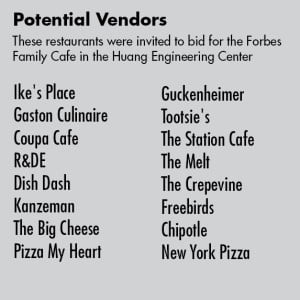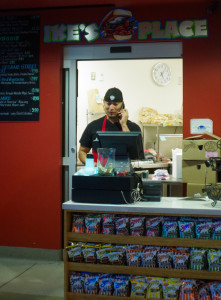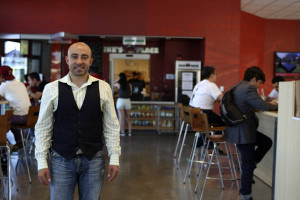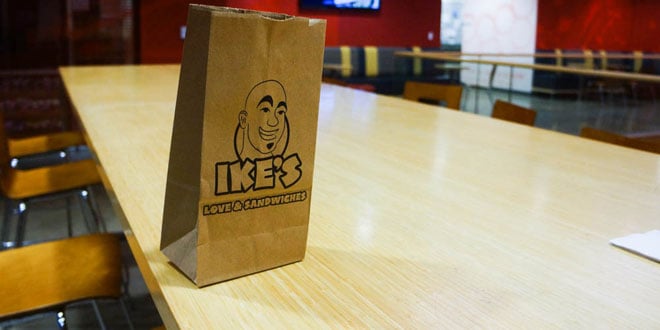Four years after establishing itself as a campus landmark, Ike’s Place is leaving.
Last Friday, students gathered in White Plaza for a “Save Ike’s” rally, handing out over 200 Ike’s sandwiches in less than 15 minutes. The demonstration followed the ASSU Undergraduate Senate’s unanimous resolution in support of Ike’s Place on May 6.
The protests and ASSU resolution come on the heels of Ike’s’ drawn-out departure from the Forbes Family Cafe in the Jen-Hsun Huang Engineering Center in the Science and Engineering Quad, where owner Ike Shehadeh had opened with much fanfare in 2009. Ike’s Place will remain open until June 15, but in the meantime, a group of more than 50 students calling themselves “Ike’s Army” have distributed fliers across campus demanding that the bustling sandwich shop return next year.
On April 25, the University announced that Ike’s Place will be replaced by an eatery operated by Stanford Residential and Dining Enterprises (R&DE) in September. R&DE has not yet announced the details of its winning restaurant concept. In the meantime, students have been left to wonder how the decision to award the contract was made, who made it and why.
Ultimately, the decision was made by the Forbes Family Cafe Request for Proposal (RFP) Committee — a group of six staff members, no faculty, one graduate student and one undergraduate student operating in close coordination with Lindsey Akin, services manager for the Science and Engineering Quad. University officials have refused to release the names of any committee members, claiming that they are confidential.
The use of confidential committees for RFPs is standard practice. In February 2009, such a committee was responsible for finding the Forbes Family Cafe’s first tenant, contacting 13 vendors before unanimously awarding Shehadeh the contract from 2010 to 2013, with an option to extend for another three years afterwards.
In September 2012, when Shehadeh stepped back from management of the Stanford location, Stanford exercised a limited option to extend the Ike’s Place lease for one more year, until June 2014.
This particular process is not under scrutiny because of wrongdoing by any department — certainly not by R&DE, whose role in this process is peripheral. It is under scrutiny because of how the RFPs, faithfully administered by administrators and officials according to University guidelines and in good faith, could reach such universally unpopular decisions.
[box type=”shadow” align=”aligncenter” class=”ikes-grid”]Scroll over the image for a timeline of the events leading up to Ike’s Place’s departure. [ubergrid id=1085670][/box]
Requests for a new proposal
In October 2013, just as Ike’s was beginning its last academic year of operations in Huang, the Stanford Purchasing and Contracts office opened the Forbes Family Cafe case for bidding. The next month, Akin, the point person for the contract, disseminated a food services survey that would be used as part of the RFP Committee’s evaluation criteria. The Committee then chose 16 local businesses to invite for a tour of the Forbes Family Cafe.

On Dec. 17, 2013, representatives from the invited vendors attended a “bid walk” at the Huang Engineering Center. Several vendors, including big-name chains like Chipotle and Pizza My Heart, were unable to seriously consider a bid because of the Forbes Family Cafe’s limited kitchen space.
Only three vendors — Coupa Cafe, Ike’s Place and R&DE — made formal bid presentations during the week of Feb. 24.
“The majority [of potential vendors] saw how small the space was and said, ‘We’re not interested,’” said Troy Sutton, the contracts manager at the Stanford purchasing department. “People walked away. They participated, but they weren’t interested in submitting a proposal.”
So by March, when the Committee met to deliberate the awarding of the lease, there were three options to compare.
According to a partial list of criteria obtained by The Daily, committee members were asked to rate each vendor’s bid on the following factors: variety of menu, seasonality, pricing, sustainability, staff benefits and turnover, wait times, company reputation and prior experience.
Akin said that content for the bid presentations was confidential. But she claimed that R&DE’s bid was the only one that not only addressed each of these criteria but also went “above and beyond.” According to Akin, R&DE was the only vendor with the foresight to delineate changes to their employee benefits because of the Affordable Care Act, for example.
“R&DE proposed a seasonal, affordable menu built around sustainable and local food,” Akin said. “Their proposal was all about sourcing locally with everything they serve.”
Questioning the survey
Part of the bid process was the survey disseminated by Akin to various science and engineering-related e-mail lists in November 2013, called “Food in the SEQ.” The survey was intended to gauge community opinion on food options and serve as the foundation for evaluation criteria during the RFP process; a press release announcing R&DE’s successful bid on April 25 prominently featured the survey results.

However, the survey has been widely criticized by students as being biased against Ike’s, and many of the survey’s 900 respondents are now upset because their responses are being cited to justify Ike’s’ departure.
Most of the survey respondents interviewed by The Daily said that their response should have indicated support for Ike’s to continue operating.
“If I had known it was a choice between Ike’s and anything else, I would have made it very clear that I wanted Ike’s,” said Ian Holmes ‘15, a survey respondent. “The survey was so deceiving, it should be invalidated.”
“I would describe the survey as designed to answer a question other than the one it was used to answer,” said Emily Grubert ‘09, a doctoral student in Earth Sciences. “My perception … was that the specific questions seemed to focus on particular elements that Ike’s was certain to score poorly on.”
The six-question survey asked respondents about desired price range, wait time and selection for a food vendor at the Forbes Family Cafe.
Multiple respondents identified one specific question that they felt was biased against Ike’s: “What do you think is a reasonable and realistic amount of time to wait, starting with getting in line up until the food is ready and ‘in your hand?’”
Akin and Jamie Beckett, director of communications and alumni relations at the Stanford School of Engineering, have repeatedly cited long wait times as a complaint about Ike’s despite the restaurant’s efforts to improve speed of service, like implementing an order-ahead/grab-and-go system.
Two students also complained that language at the top of the survey suggested that the RFP was a legally mandated formality and misled them to believe that Ike’s was in no real danger.
“For legal reasons, we have to invite several businesses, not just Ike’s, to bid,” the survey read.
Allegations that the survey was an inaccurate representation of student opinion spread across major campus e-mail lists on April 28 and 29. A new survey, fielded by Andrew Aude ‘16, asked respondents whether they would prefer Ike’s or R&DE to operate in the SEQ (Science and Engineering Quad) next year.
In this survey, more than 97 percent of respondents — in a sample more than three times the size of the RFP Committee’s — indicated that they would like Ike’s to continue operating next year.
Beckett maintained that the risk of Ike’s Place losing its lease was always implicit in the RFP Committee’s survey.
“I don’t understand how that could not be understood [by respondents],” she said. “If a contract is coming up, which the survey says, then there is always a chance that the business could lose it.”
Sutton, responsible for ensuring Stanford’s RFP processes occur legally and transparently, stressed the importance of defining the goal of the survey process.
“Depending on how you phrase the question, you’re going to make people look happy or unhappy,” he said.
Akin, who was responsible for creating, disseminating and analyzing the survey, declined to acknowledge any problems with the survey’s design or how its recommendations were used in the RFP Committee’s deliberations.
“Given that it went out to the whole SEQ population and we got so many results back, I can only assume it was valid,” she said.
Why Ike’s is really leaving
Much has been made of the confidential identities of the RFP Committee and problems with its community opinion survey, but the reality is that the Committee had little choice in the matter of who would be awarded the Forbes Family Cafe contract.
Because of Ike’s Place’s past “business” issues in dealing with the University, they were not a competitive bidder in the Committee’s deliberations. These issues also played a role in the School of Engineering’s decision to only partially exercise an option to keep Ike’s Place operating past June.
The decision that set off the multi-office RFP process was made in September 2012, when officials from the School of Engineering and the SEQ decided to option the Forbes Family Cafe lease for one out of the three possible years.

According to Akin, the decision to extend for only a year was based on “various persistent issues,” citing a range of past problems including long lines, loud music and alleged “vulgarities” used by Ike’s employees at work.
None of the officials contacted for this article could comment on the specifics of these “business” or “facilities” issues.
When asked how loud music or casually dressed employees were grounds to replace a business on campus, Akin replied, “We have deans and donors eating here.”
These “persistent issues” likely played a significant part in the decision to award the Forbes Family Cafe contract to a vendor other than Ike’s. As SEQ services manager, Akin briefed the RFP Committee on the University’s dealings with Ike’s since 2009, and according to Sutton, the bid process included specific questions posed to each vendor that addressed client needs and concerns.
“Something we generally try to do with all RFPs is wrap all the specific issues into questions for all vendors,” he said. “So if we have a question about A, we will ask ‘How will you deal with it going forward?’ ‘What is your proposal to deal with B?’”
Ike Shehadeh, the owner of Ike’s Place, acknowledges the University’s right to award the Forbes Family Cafe lease to another vendor. However, he expressed disappointment with the problems that the University cited to justify ending the lease.
“My understanding of all the issues were that they were little issues,” he said. “As far as I know, they were unhappy with what we were doing, pretty much from the first day that we got there. If we were Starbucks, they wouldn’t kick Starbucks out over this.”
A lesson from Ike’s
The opacity of the RFP process has amplified the uncertainty and misinformation surrounding Ike’s’ departure. It remains true that the only people who know the content of the relevant bids are the eight confidential committee members and the administrators who have worked on the lease.
Additionally, despite repeated inquiries, officials at multiple University departments have rebuffed attempts to view the contents of the bids, the supplementary materials provided to the Committee to help evaluate the candidate vendors and the full list of evaluation criteria.
Despite the fact that no student consultative mechanism was required to inform the committee, Akin determined that fielding a survey was in the best interests of the community. However, the poor survey design has opened up the RFP process to accusations of pro-R&DE bias. No evidence exists to substantiate that charge, but obvious deficiencies in survey methodology and analysis — like the refusal to disseminate the raw data and administrators’ disinterest in finding the survey response rate — are at best inept and at worst dishonest.
Finally, the RFP process at Stanford remains opaque and unrepresentative. In an open letter to University President John Hennessy, ASSU Senator John-Lancaster Finley ‘16 argued that the RFP Committee and its decisions were unconstitutional according to Article I, Section 5.A of the ASSU Constitution, which stipulates that only the ASSU can designate students to represent the student body.
“[Hennessy’s] response to me was that although he was sympathetic to the issue I raised, the University is not bound by the constitution or its agreement to students,” Finley said. “He told me to talk to his legal counsel.”
Akin also acknowledged the importance of gathering community opinion despite the fact that it was not necessitated by any policy or rule.
“It’s going to be a good idea to get student opinion,” she said of her priorities in organizing the Forbes Family Cafe RFP. “If Ike’s just left, and no one was consulted, there would be a revolt.”
Contact Edward Ngai at edngai ‘at’ stanford ‘dot’ edu.
